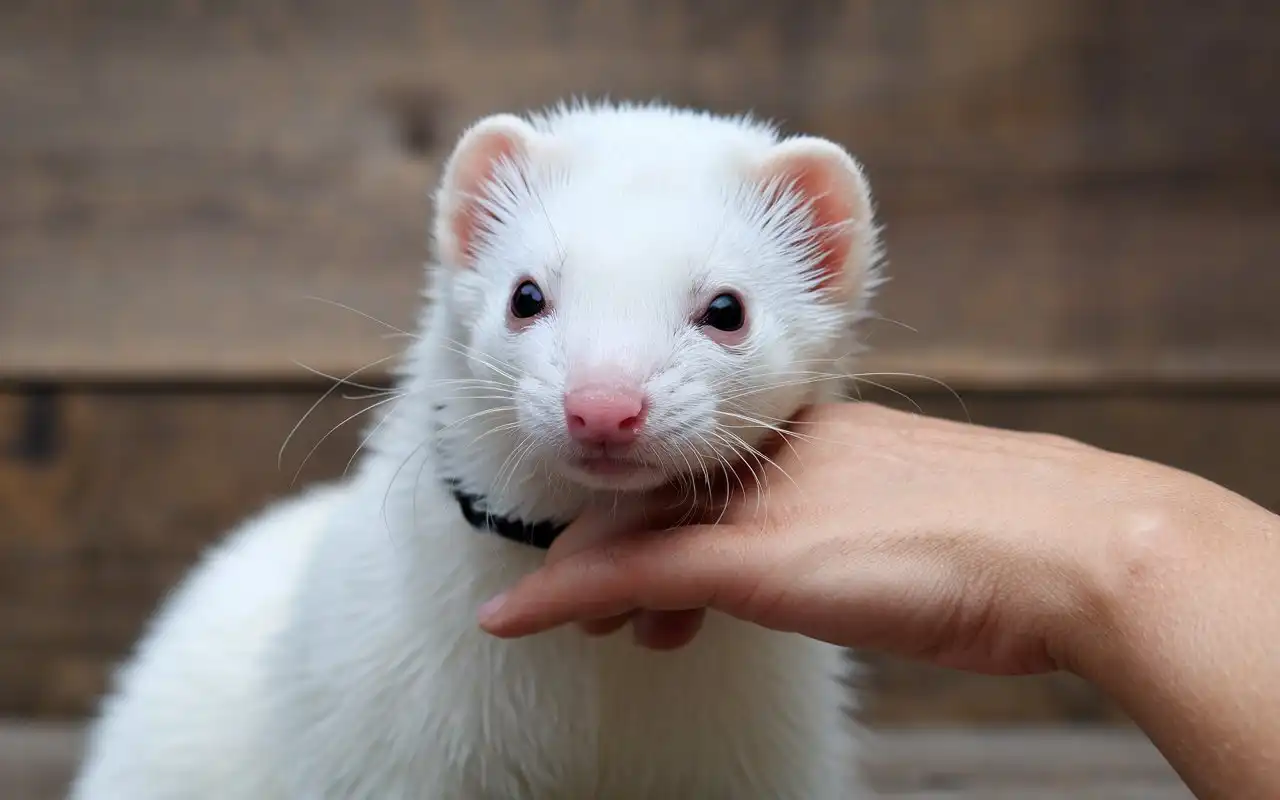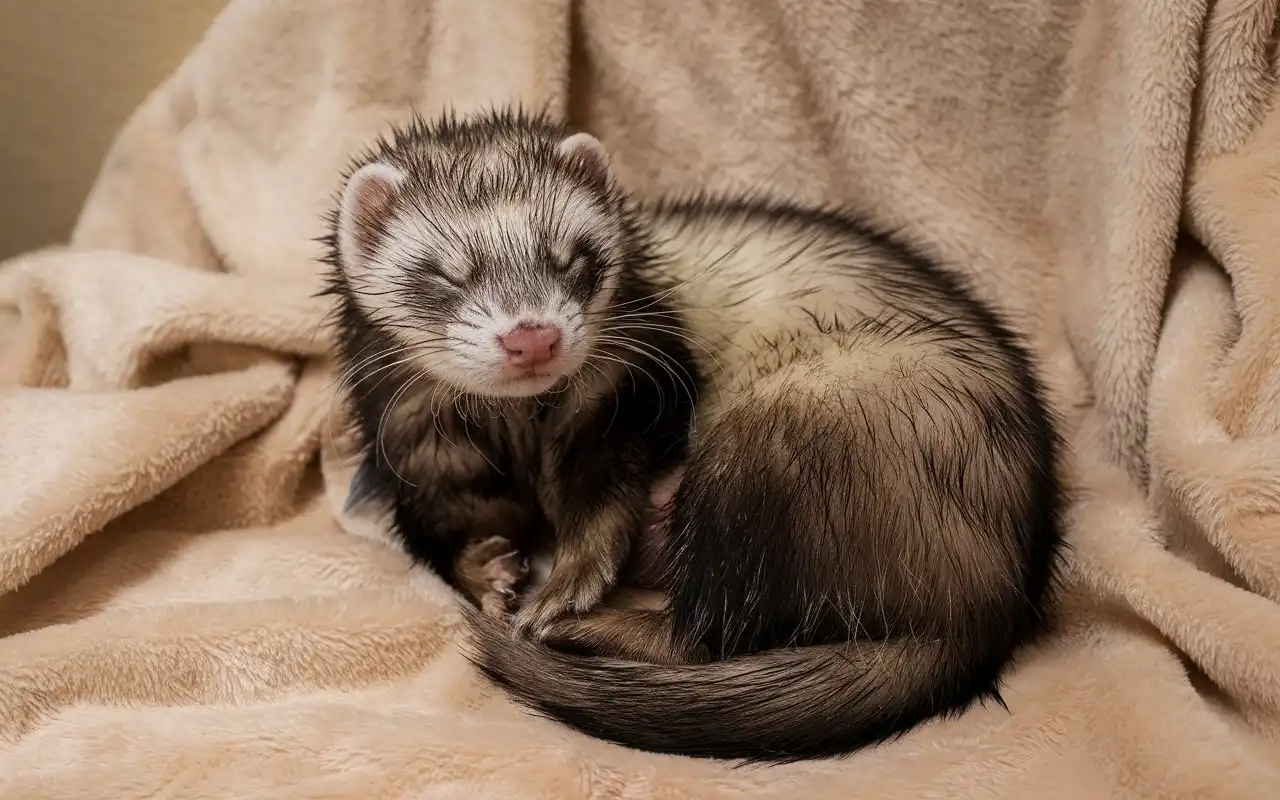Are ferrets aggressive? Many people wonder about this when considering them as pets. Ferrets are mischievous and curious. Their playful energy leads to misunderstanding. Some see their high-energy antics, such as nipping and roughhousing, as aggression, but is this really the case? Ferrets are smart, social creatures. They often use their mouths to explore and communicate with their owners. This article will explore what affects a ferret’s behavior. Are they naturally aggressive, or are their bad reputations based on myths?
Table of Contents
History of Ferrets: From Domestication to Today
Ferrets in Ancient Times
Ferrets have been domesticated for more than 2,500 years, with their roots tracing back to ancient civilizations. They were mainly used for hunting small game, especially rabbits. Their slender bodies and natural burrowing instincts made them ideal for this. The Greeks and Romans used ferrets in farming to control rodents. Some may think their hunting role makes them aggressive. But, domestication has softened their wild instincts. They are now better pets.
Modern Ferrets and Their Popularity as Pets
In the modern era, ferrets are far removed from their days as hunting companions. They are now one of the most popular exotic pets in many parts of the world, particularly in the United States and Europe. Their playful nature and small size make them ideal pets. They suit those who want an interactive, affectionate companion. Though they were once hunters, most modern ferrets are friendly. They are inquisitive and enjoy human companionship. With training and care, they make great family pets.

General Characteristics of Ferrets
Natural Instincts and Ferret Personality
Ferrets are naturally curious and active animals. They spend a lot of time exploring their environment, climbing, and engaging in playful behavior. They have high energy, especially at playtime. They take pleasure in activities that include stalking and seeking. While their behavior can be boisterous, this is not a sign of aggression. Ferrets use their mouths when they play. They may nip or bite lightly, like kittens or puppies. This behavior, however, is rarely intended to cause harm and is usually a part of their social play.
How Ferrets Interact with Other Pets and Humans
Ferrets are highly social animals and thrive on interaction with both humans and other pets. They are known for forming strong bonds with their owners and can be very affectionate. When properly introduced, ferrets can also get along well with other pets, such as cats and dogs. It’s essential to monitor these interactions, especially early on. It ensures the other animals understand the ferret’s playful behavior. Ferrets may seem aggressive toward unfamiliar animals. But, it’s usually fear or overstimulation, not true aggression.



Are Ferrets Aggressive by Nature?
Understanding Aggression in Animals
Aggression in animals, including ferrets, is a complex behavior. It can be triggered by fear, territorial instincts, or physical discomfort. In ferrets, true aggression is rare, and when it does occur, it’s often a response to a specific situation rather than a general personality trait. Ferrets, like many animals, may get defensive if they feel threatened or are in an unfamiliar, uncomfortable place. Understanding the root cause of any aggressive behavior is key to managing and preventing it.
Debunking Common Myths About Ferret Aggression
Many myths surround ferret behavior. One is that ferrets are naturally aggressive. This myth likely stems from misunderstandings about their playful biting, also known as “nipping.” While ferrets do use their mouths during play, this is not usually a sign of aggression. Instead, it’s part of their natural way of exploring their environment and interacting with others. Ferrets rarely show unprovoked aggression, and when they do, it’s often because of fear, pain, or a lack of socialization.

Factors That Influence Ferret Aggression
Genetics and Breeding
Just like with other animals, genetics can play a role in shaping a ferret’s behavior. Certain breeding practices can influence whether a ferret is more prone to aggressive behavior. Ferrets that come from breeders focused on temperament and health tend to be more balanced and easier to handle. On the other hand, ferrets from poor breeding, like “ferret mills,” may be aggressive. They may have other behavioral issues, too. When choosing a ferret, research the breeder’s reputation. This ensures you get a well-socialized, healthy pet.
Environment and Socialization
A ferret’s environment has a significant impact on its behavior. Ferrets that are raised in a positive, nurturing environment and are socialized from an early age tend to be more relaxed and friendly. Early socialization helps ferrets get used to humans, other animals, and new experiences. A ferret that feels safe and secure in its environment is less likely to display aggressive behaviors. On the other hand, isolated or stressed ferrets may become fearful. This can lead to aggression.
Health Issues and Pain
Aggressive behavior in ferrets can sometimes be a sign that they are in pain or experiencing a health issue. Like humans, animals can become irritable and defensive when they’re not feeling well. Common health issues in ferrets, such as dental problems, adrenal disease, or digestive discomfort, can cause them to act out. If a friendly ferret becomes aggressive, it may have a medical issue. A vet should check them.
How to Handle Ferrets Aggressive Behavior
Early Socialization Tips
Socializing your ferret early on is one of the most effective ways to prevent aggressive behavior. This includes introducing them to a variety of people, animals, and environments while they are still young. Familiarizing your ferret with new sights, sounds, and smells will reduce their fear of the unknown. This fear can cause defensive behavior. Gently and positively handle your ferret to build trust. It will reduce aggression as they grow.
Positive Reinforcement Training
Use positive reinforcement to train your ferret. It’s a key way to manage and prevent aggression. Reinforcing positive actions with rewards, compliments, or fun aids. It shows that positive actions lead to positive outcomes. Ferrets are intelligent animals and can quickly learn what behaviors are acceptable. Avoid using punishment, as this can lead to fear and anxiety, which can, in turn, cause aggressive behavior.
Consulting a Veterinarian or Behavior Specialist
If your ferret is often aggressive, consult a vet or a ferret behavior expert. There could be underlying health issues or psychological factors contributing to their behavior. A professional can help identify the root cause of the aggression and provide tailored advice or treatment to address it. Sometimes, medications or special training may help manage aggression.
Are Ferrets Aggressive Towards Other Animals?
Ferrets and Cats: A Unique Relationship
Ferrets and cats can form unique bonds. Both species are known for their playful nature, which can lead to a fun and interactive relationship. Yet, it’s vital to monitor their engagements at the outset. This is to prevent misunderstandings from the ferret’s playful nipping or the cat’s hunting instincts. In most cases, with proper introductions and time, ferrets and cats can coexist peacefully and even become friends. Aggression between the two is uncommon when the animals are introduced properly.
Ferrets and Dogs: Coexistence or Conflict?
Ferrets and dogs can also live together, but the introduction process is critical. Some dogs, especially those with a strong prey drive, may see ferrets as something to chase. On the other hand, some dogs can be gentle and accepting of ferrets, treating them as part of the pack. To ensure peace, introduce them in a controlled environment. Never leave them unsupervised until you are sure they can interact safely. Aggression from either animal usually stems from poor introductions or mismatched personalities.

Conclusion
In conclusion, ferrets are not naturally aggressive animals. They may nip playfully or act defensively in some cases. But, these behaviors are not usually signs of true aggression. Owners can keep their ferret friendly by knowing what affects its behavior. These factors include genetics, environment, and health. To raise a happy, well-behaved ferret, socialize it. Use positive reinforcement training. Also, get regular vet care. With the right care and attention, ferrets make affectionate, playful, and loyal pets.






